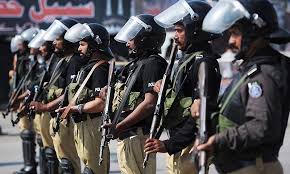Sajid Mumtaz Khan
Residential problems often pose significant challenges for police personnel, particularly in terms of housing affordability and availability. Implementing housing schemes or rental assistance programs can help alleviate these concerns, ensuring that officers have access to safe and affordable housing options near their duty stations.
Feeding arrangements during duty hours are crucial for ensuring officers’ nutritional needs are met while on duty. Providing subsidized or free meals at police stations or designated locations can ensure that officers have access to nutritious food throughout their shifts, thereby enhancing their overall well-being and performance.
Transportation to the spot of duty is another welfare measure that can significantly improve officers’ quality of life and job satisfaction. Providing reliable and safe transportation options, such as shuttle services or transport allowances, can help officers commute to their duty stations more efficiently, reducing stress and fatigue associated with long commutes.
Psychological sessions and support services are vital for addressing the mental health challenges faced by police personnel. Regular counselling sessions, stress management workshops, and access to mental health professionals can help officers cope with the demands of their profession and mitigate the risk of burnout, PTSD, and other mental health issues.
Regular medical check-ups, conducted every six months, can help identify and address health issues early, ensuring that officers receive timely medical care and support. Additionally, implementing support schemes such as insurance coverage, pension plans, and disability benefits can provide financial security and peace of mind to police personnel and their families.
Regulating duty hours and responsibilities: Regulating duty hours and responsibilities is essential for ensuring the well-being, efficiency, and effectiveness of police personnel. This includes implementing policies and practices that address issues such as long working hours, monotony in job roles, and the allocation of responsibilities. One crucial aspect of regulating duty hours and responsibilities is establishing a strict policy of transfer postings.
Transfers and postings play a significant role in maintaining organizational efficiency and preventing the development of entrenched power dynamics or vested interests within the police department. By instituting a transparent and merit-based transfer policy, the department can ensure that officers are deployed to different postings periodically, allowing for the redistribution of skills and experiences across various units and locations.
Overall, regulating duty hours and responsibilities requires a multifaceted approach that encompasses transfer policies, job rotation, allocation of clerical staff, and clarity in role assignments. By implementing these measures, the police department can enhance organizational efficiency, promote job satisfaction, and ultimately, improve its ability to serve and protect the community.
Inclusive reform approach: An inclusive reform approach is vital for ensuring that the transformation of the police department in Pakistan is comprehensive, transparent, and responsive to the needs and concerns of all stakeholders. This approach entails actively engaging with the public, legislative assemblies, and internal stakeholders to solicit feedback, identify areas for improvement, and foster a sense of ownership and accountability.
One essential aspect of an inclusive reform approach is to facilitate debates and discussions on public forums and legislative assemblies. These platforms provide opportunities for citizens, civil society organizations, lawmakers, and other stakeholders to voice their opinions, share their experiences, and contribute to the reform process. By promoting open dialogue and constructive debate, the police department can gain valuable insights into public perceptions, priorities, and expectations, thereby fostering greater trust and confidence in the reform efforts.
Furthermore, an inclusive reform approach involves rectifying weak aspects or areas identified through institutional surveys and assessments.
These surveys can be conducted periodically to evaluate the effectiveness of reform initiatives, identify areas of improvement, and address any gaps or shortcomings in the implementation process. By taking a data-driven approach to reform, the police department can ensure that resources are allocated effectively, priorities are aligned with the needs of the community, and progress is monitored and evaluated rigorously.
The need for comprehensive reforms within Pakistan’s police department is undeniable. The challenges facing law enforcement are multifaceted and deeply entrenched, requiring a concerted and multifaceted approach to address effectively.
As the custodians of law and order, the police department plays a pivotal role in safeguarding citizens’ rights, maintaining public safety, and upholding the rule of law. However, to fulfil this mandate effectively, substantive reforms are urgently needed across various dimensions.
Conclusion: First and foremost, reforms in the service structure are imperative to promote professionalism, meritocracy, and accountability within the police department. This includes revising recruitment processes to ensure transparency and merit-based selection, instituting standardized promotion policies, and establishing clear performance evaluation mechanisms. By fostering a culture of excellence and integrity, the police department can attract and retain the best talent, thereby enhancing its overall effectiveness and credibility.
Mitigating the trust deficit between the police and the public is essential for building confidence, enhancing cooperation, and fostering positive relations within communities. This requires proactive efforts to engage with the public, promote transparency, and address concerns related to accountability and integrity. By actively soliciting feedback, addressing grievances, and fostering dialogue and collaboration, the police department can bridge the divide between law enforcement and the communities they serve, thereby fostering a safer and more inclusive society.
The journey towards reforming Pakistan’s police department is both challenging and essential. By prioritizing reforms in service structure, duty hours, welfare measures, and trust-building initiatives, Pakistan can build a police force that is truly responsive, accountable, and dedicated to serving and protecting all citizens. It is only through sustained commitment, collaboration, and innovation that Pakistan can realize its aspirations of a fair, just, and secure society for all.
(Concluded)







